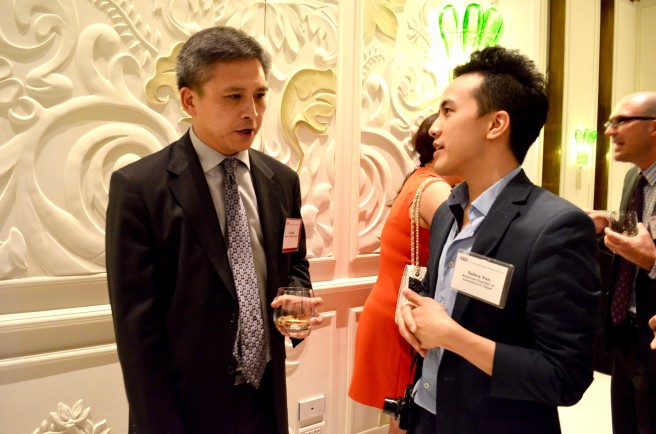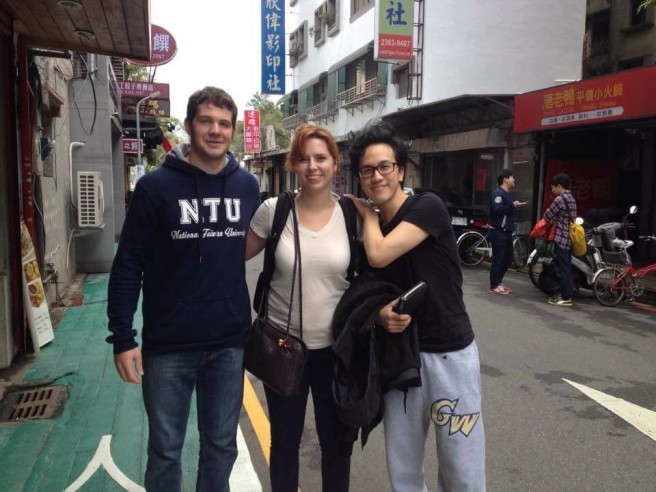Allow us to introduce you to one of ESIA’s current students, Sebra Yen. Sebra is an M.A. Candidate in our Global Communication program (2017), with a concentration in Asian Studies. Sebra is currently a NSEP Boren Fellow in Taiwan (2015-16).
Sebra Yen, MA Global Communications
大家好 (Dàjiā hǎo)! 打給賀 (Dǎ gěi hè)! 台尬後 (Tái gā hòu)! Lokah su ga! That means hello in Mandarin, Taiwanese, Hakka, and the Atayal language, one of the Formosan languages spoken in the beautiful island of Taiwan, respectively. These languages make up the diversity of communication used in Taiwan, with Mandarin as the official language.
One of the special features of learning Mandarin in Taiwan is Zhuyin Fuhao. Zhuyin Fuhao, also known as Bopomofo, is the system of phonetic symbols used to notate Mandarin. So for大家好 (Dàjiā hǎo), it would turn out like this: ㄉ ㄚˋㄐ一ㄚ ㄏㄠˇ! While the Mainland uses Pinyin, Taiwan uses Zhuyin, which is comprised of 37 special symbols to represent the Mandarin sounds. It is highly encouraged by teachers to use this system because it helps students develop better pronunciation. Taiwan also uses Traditional Chinese characters as opposed to Simplified Chinese characters. These are just some interesting things I have learned during my time as a Boren Fellow in the heart of Asia.
Hello, my name is Sebra Yen, and I am a graduate student in the Global Communication program (Asian Studies concentration) at The George Washington University’s Elliott School of International Affairs in Washington, DC. My research interests include the domestic politics and foreign relations of Taiwan, cross-Strait relations, and U.S. policy towards Asia. My decision to apply for the National Security Education Program (NSEP) David L. Boren Fellowship in Taiwan was heavily influenced by my desire to promote U.S.-Taiwan relations as a Public Diplomacy Officer with the U.S. Department of State. Upon graduating with a master’s degree from the Elliott School, I hope to join the Foreign Service and utilize my Chinese language skills through traditional (people-to-people exchanges) and new (social media) communication means to strengthen understanding and engagement with the people of Taiwan. Accordingly, the Boren Fellowship allows me to focus on my language acquisition as well as research and academic internships related to my program proposal.
I’m currently at the National Taiwan University in Taipei, Taiwan for intensive Chinese language study with the Chinese Language Division of the university’s language center as well as the International Chinese Language Program (ICLP). These programs are important to my training as an aspiring diplomat, as it is my dream to become a skilled spokesperson when communicating U.S. policy towards Asia and forging relationships across Greater China. In addition to language learning, I have also pursued internships related to my study of Taiwan with the American Chamber of Commerce in Taipei and Ketagalan Media, a media outlet uncovering the latest stories happening in Taiwan, focusing on Taiwanese history, politics, and culture. I assisted with the Publications Department and strategic communications at AmCham Taipei, and I am currently translating for Ketagalan Media. These activities enhance and support one of the main purposes of a Boren Fellowship: learning to communicate across cultures as well as analyzing economic, political, religious, and global perspectives in Taiwan.

Internship at AmCham Taipei offered the opportunity to meet AIT Director, Kin Moy.
On top of school and work, I had the opportunity to travel to many places in Taiwan, including Jiufen, Yilan, and Tamsui. Another place worth noting is probably Smangus, an aboriginal Atayal tribe and the most remote aboriginal village in Taiwan. The beautiful natural surroundings of the village only complement the fact that the people of Smangus have adopted a communitarian system where every adult receives the same monthly salary from the elders, in order to preserve their culture. Observing their way of life has been fascinating and I hope to increase my travel to other places in Taiwan to hear their stories. Tainan (the former capital) and Kaohsiung (the second largest city of the island) are on the list. Engaging with the different people of Taiwan and getting their perspectives on politics and identity is very important to me as an international affairs professional focusing on Taiwan. As Taiwan recently went through an election on January 16, 2016, electing its first woman president and a legislature mostly composed of the opposition party, the status quo could change in cross-Strait relations, and the U.S.-Taiwan-China relationship will be interesting to observe in the upcoming months. I feel grateful to be here in Taiwan to do that, and I am thankful to represent The George Washington University’s Elliott School of International Affairs as a Boren Fellow.

A visit to Smangus, Taiwan.

With the other two Boren Fellows (2015-16) in Taipei, near National Taiwan University.
Want to connect with current Elliott School students and alumni? Click here to see how!
Find out more about this program by creating a CustomViewbook!
Join us for an information session, RSVP here!
Click here to apply to the Elliott School!
Twitter · Facebook · Instagram
The views expressed by students profiled do not necessarily represent those of organizations they work for, are affiliated with, or the Elliott School of International Affairs.




